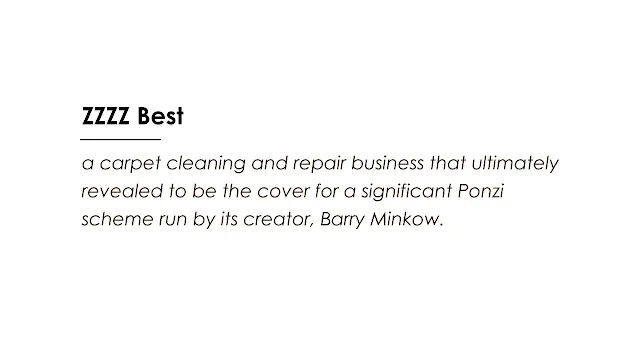 |
| Image: Moneybestpal.com |
ZZZZ Best was a carpet cleaning and repair business that ultimately revealed to be the cover for a significant Ponzi scheme run by its creator, Barry Minkow.
After the scam was discovered, the company folded in 1987, leaving investors and lenders with losses of $100 million. The company had gone public in 1986 and had a valuation of over $300 million. This case represents one of the greatest accounting and investment frauds ever perpetrated by a single person.
Investors and lenders were interested in ZZZZ Best after being struck by its quick expansion and profitability. In December 1986, Minkow took the business public and raised $15 million through the IPO. Within a few months, the share price of the company rose from $4 to $18 per share, making Minkow an apparent multimillionaire.
But as ZZZZ Best struggled with cash flow issues and came under closer attention from auditors and regulators, the Ponzi scheme started to fall apart. In an effort to stop the fraud, Minkow made an offer to pay $25 million to acquire KeyServ, a legitimate carpet cleaning business owned by Sears. When ZZZZ Best's auditors discovered that the company's insurance restoration contracts were phony, the sale was abandoned.
A woman who had been overcharged by ZZZZ Best for carpet cleaning services also revealed the deception. She was tenacious in her investigation and discovered the paper trail that connected Minkow's unlawful activity. She made the authorities and the media aware, which led to an investigation that exposed the fraud's scope.
Minkow was detained in July 1987, and 57 counts of racketeering, securities fraud, embezzlement, money laundering, mail fraud, tax evasion, bank fraud, credit card fraud, and other offenses were brought against him. After entering a guilty plea, he received a 25-year prison term. He also agreed to give his victims $26 million in reparations.
According to Minkow, organized criminal leaders threatened his life and the lives of his family in order to force him into committing fraud. In addition, he laid the blame for the fraud on his auditors, bankers, lawyers, and accountants. He eventually acknowledged that he was the only one accountable for the fraud and that he had lied about his connections to the mob.
Minkow served seven years in prison until being freed in 1995. In San Diego, he went on to become a pastor and a fraud investigator. He also gave sermons about morality and atonement in churches and academic institutions. He soon resumed his fraudulent behavior, though, and took part in a number of other con games.
He admitted in 2011 to planning to manipulate the stock price of Lennar Corporation, a homebuilder business that he had investigated and accused of wrongdoing. He was given a five-year prison term and told to repay Lennar $583.5 million in compensation.
He acknowledged cheating his own church and its followers in 2014 by stealing money and spending it for personal expenses. He received a further five years in prison as well as a $3.4 million restitution mandate to the church.
Minkow is currently serving his sentence at a federal prison in Florida. He is expected to be released in 2024. He is subject to restitution requirements totaling $612 million.
The ZZZZ Best case is a well-known illustration of how greed, deceit, and a lack of morality can have terrible effects on investors, lenders, workers, consumers, and society as a whole. Additionally, it demonstrates how faking revenues, assets, liabilities, and expenses can result in accounting fraud. It serves as an example of the value of due diligence, internal controls, auditing standards, corporate governance, and regulatory monitoring in preventing and identifying financial scams.
